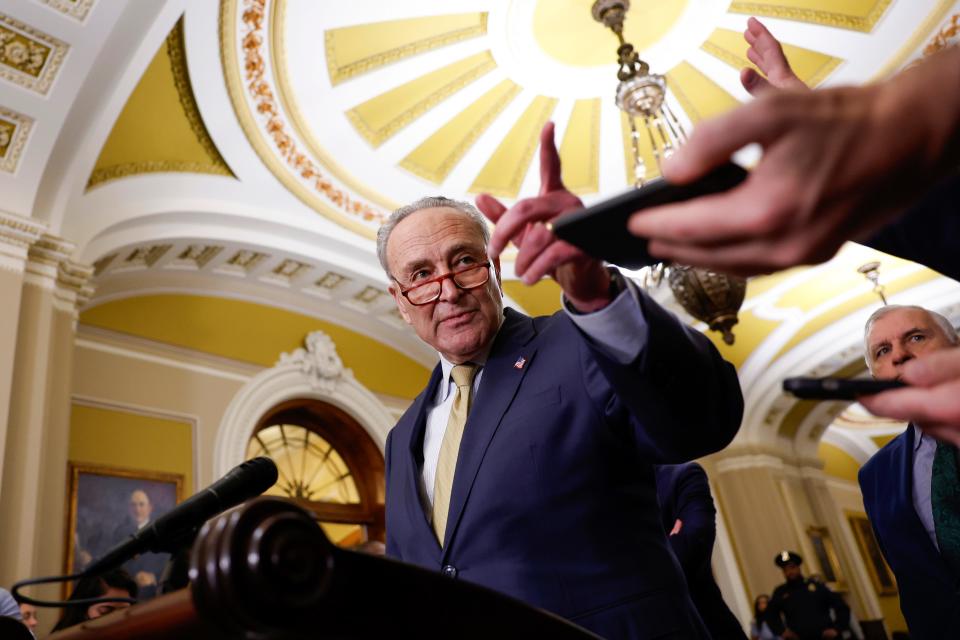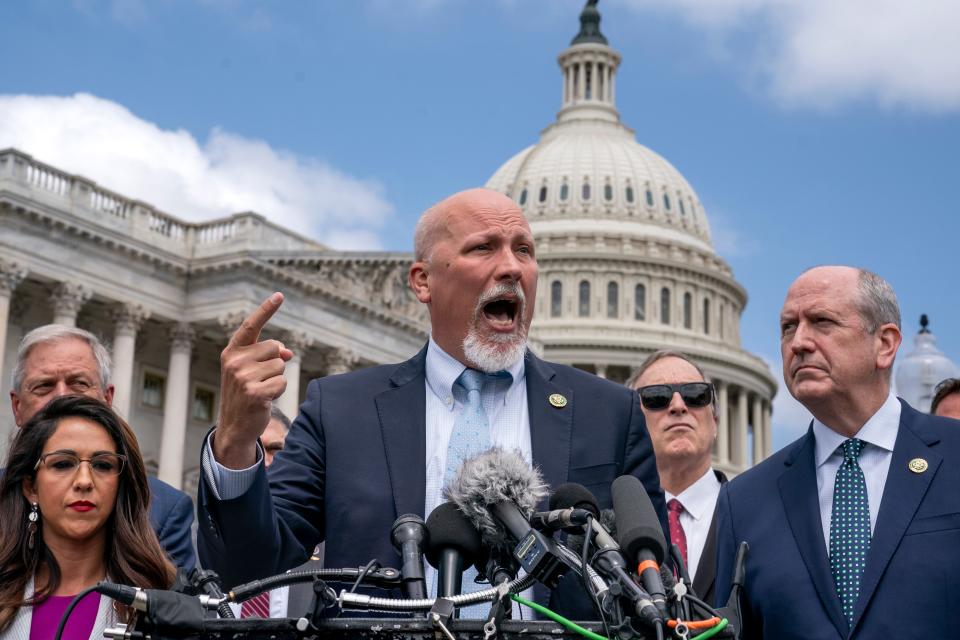Congress is trying to dodge a government shutdown. They have to clear 3 hurdles first.
- Oops!Something went wrong.Please try again later.
- Oops!Something went wrong.Please try again later.
- Oops!Something went wrong.Please try again later.
- Oops!Something went wrong.Please try again later.
WASHINGTON – There are 10 days until the country once again faces the possibility of a government shutdown because Congress failed to fund key agencies serving Americans.
Funding for agriculture, energy and water, military construction and veterans affairs, transportation and housing programs will expire on Jan. 19. The rest of the government’s funding expires on Feb. 2.
In an attempt to avoid that fate, Senate Majority Leader Chuck Schumer, D-N.Y. and House Speaker Mike Johnson, R-La., announced a plan on Sunday. The lawmakers called for a spending package in line with the debt ceiling deal struck between former Speaker Kevin McCarthy, R-Calif., and President Joe Biden, around $1.66 trillion total.
Their agreement came weeks after Congress extended its own government funding deadline for the second time in recent months. The budget is officially due every year on Sept. 30, and the first extension cost McCarthy his job after a handful of Republicans rebelled while he worked across the aisle with Democrats.
Setting an overall funding level is the first step to keeping the government open, but lawmakers will still have to agree on funding levels for each of twelve appropriations bills, work out policy disagreements and dodge political infighting if they hope to avoid a shutdown.
A ticking clock
Passing full spending bills in Congress' timeframe will be tough. So much so that multiple members are asking to push the deadline once again.
On Tuesday, Senate Minority Leader Mitch McConnell, R-Ky., said there will "obviously" need to be another continuing resolution, a temporary measure that kicks the can down the road for lawmakers as they negotiate.
The second-ranking Republican, Sen. John Thune, R-S.D., also suggested punting to March: "We're not going to get all the appropriation bills done by the coming deadline."
Johnson, who previously pledged not to pass another short-term extension, demurred when asked about the possibility Tuesday, saying House Republicans are "pedal to the metal" on the budget.
Schumer was more optimistic: There's "real consensus" among Republican and Democratic leadership in both chambers, he said. "We're going to fight as hard as we can to get this done as soon as possible."

Democrats have repeatedly said they are against a full-year extension – an option Johnson floated as an alternative to hitting the budget deadline. That would extend current funding levels through the fiscal year and allow lawmakers to focus on crafting a budget for the next one, which begins in October.
Senate Democrats have said that option is a no-go because it would trigger across-the-board budget cuts that would disproportionately impact nondefense spending, due to the McCarthy-Biden deal to raise the debt ceiling.
Conservative outrage
House Republicans' most conservative members are outraged by the total spending numbers Johnson and Schumer announced Sunday, arguing the agreement doesn't make enough cuts. The ultraconservative Freedom Caucus quickly deemed the spending agreement “a total failure."
Their fury echoes the fight that shook Washington last year: House Republicans kicked McCarthy out of leadership for passing a funding extension to avert a shutdown. When Johnson proposed a second extension in November, 93 Republicans voted against it, and it passed with more Democratic support than GOP votes.
At the time, the caucus did not threaten to topple their leader again. But this time, Johnson may not get the same chance.
Rep. Chip Roy, R-Texas, didn't rule out ousting Johnson over the funding agreement, though he noted it wasn't his preferred solution. "Johnson is doing all the same stupid crap that we opposed," he told Fox News.

The fiery reaction from his own caucus may complicate Johnson's ability to shepherd a full budget or another extension through the House. House Republicans have an even slimmer majority than they had last year, as McCarthy resigned, Rep. Bill Johnson, R-Ohio, left for another job, and Rep. George Santos, R-N.Y, was expelled.
That means the House will have 219 Republicans and 213 Democrats, leaving Republicans only three votes to spare – an incredibly fragile majority that was unstable even before the departures.
Republicans priorities
The backlash from right-wing Republicans puts additional pressure on Johnson to deliver conservative policy priorities that will feel like a win to his caucus.
The House GOP has previously proposed conservative policies be added to the budget, such as legislation that would bar federal funding for hospitals or organizations that train medical providers in abortions. They have also zeroed in on a Health and Human Services rule to prevent healthcare discrimination against LGBTQ people, schools that allow transgender athletes to participate in sports and more.
“By agreeing to more excessive spending, surely there are really big policy wins? Right?!?,” Rep. Warren Davidson, R-Ohio, wrote on X.

Johnson said Tuesday that's the plan.
"This allows us to fight for our policy priorities, for our policy riders," he told reporters. "Our appropriators are resolute on doing that. The members are excited about getting that done."
But Democrats have repeatedly said they won't support any budget legislation that includes those policy add-ons, referring to them as "poison pills."
"We will not be able to get any of our bills done if House Republicans insist on partisan poison pills that we all know are non-starters," Senate Appropriations Chair Patty Murray, D-Wash., said in a statement Tuesday.
Sen. John Boozman, R-Ark., told reporters that the House Republican policy priorities face an uphill climb because the Senate and White House are controlled by Democrats
"It makes it really difficult," he said. "They’re going to have to work it out."
Contributing: Ken Tran, USA TODAY
This article originally appeared on USA TODAY: Government shutdown 2024: Lawmakers have to clear these 3 hurdles

